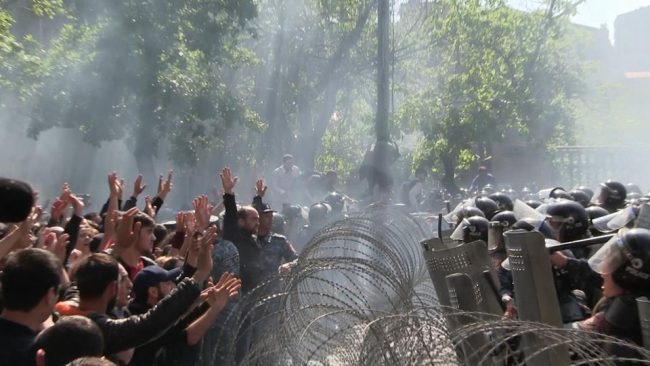Analysis | Dissatisfaction with government and support for protests increased during Sargsyan’s rule



 CRRC examines how data showed increasing levels of dissatisfaction with the government and increased support for protests in the run-up to Armenia’s ‘Velvet Revolution’.
CRRC examines how data showed increasing levels of dissatisfaction with the government and increased support for protests in the run-up to Armenia’s ‘Velvet Revolution’.
Serzh Sargsyan, formerly the President and then Prime Minister of Armenia, resigned from office on 23 April following 11 days of peaceful protests. Over the past 10 years, which coincide with Sargsyan’s time in office, Armenians were increasingly dissatisfied with their government. At the same time, the country witnessed growing civic engagement, with ‘youth-driven, social media-powered, issue-specific civic activism’, referred to as ‘civic initiatives’. CRRC’s Caucasus Barometer data from 2008–2017 reflect both these trends.
While in 2008, 53% of the Armenian public thought people were not treated fairly by the government, 74% did so in 2017.
Note: For the chart above, original answer options ‘Completely agree’ and ‘Somewhat agree’ were combined into the category ‘Agree’, and answer options ‘Completely disagree’ and ‘Somewhat disagree’ were combined into the category ‘Disagree’.
Moreover, trust in political institutions declined precipitously over the years. For example, distrust in the executive government increased from 38% in 2008 to 59% in 2017.
Note: A show card with a 5-point scale was used during the survey. For this chart, original answer options ‘Fully trust’ and ‘Trust’ were combined into the category ‘Trust’, and answer options ‘Fully distrust’ and ‘Distrust’ were combined into the category ‘Distrust’.
Throughout this period, only 3%–6% of the population of Armenia reported that they thought Armenia was a full democracy. A further 11%–18% thought the country was a democracy with minor problems. At the same time, approximately half of the population believed democracy to be preferable to any other kind of government.
As dissatisfaction was on the rise, so too was Armenians’ support for the idea that people should engage in protest actions against the government to show that the people are in charge. While in 2008, 59% of the population of Armenia agreed with this statement, 70% did in 2017.
Although CRRC data could surely not have predicted the events of the last few weeks in Armenia, it does demonstrate the growing dissatisfaction with government and increased willingness to protest that developed over the course of Serzh Sargsyan’s time in office.
To explore Caucasus Barometer data further, visit CRRC’s online data analysis portal, here.
Note: The 2017 data presented above makes use of preliminary population weights. The final population weights were not possible to complete in time for publication of this blog post. Hence, the figures for 2017 may change slightly, once the 2017 Caucasus Barometer Armenia survey weights are calculated.
Dustin Gilbreath is the Deputy Research Director of CRRC-Georgia. The views presented in this article do not necessarily represent the views of CRRC-Georgia, the National Democratic Institute, or any related entity.








